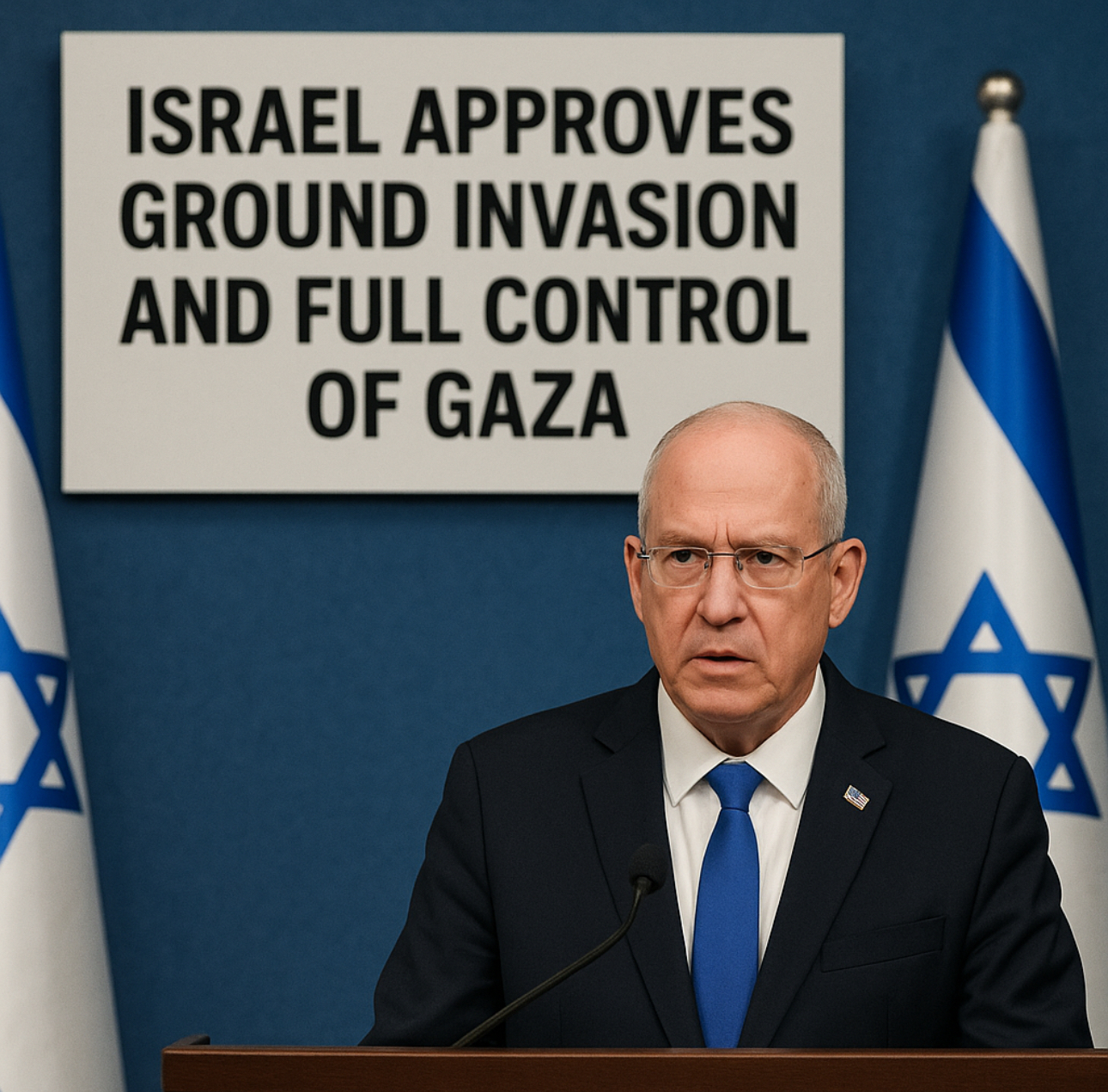The Israeli Security Cabinet has authorized a comprehensive military operation to take full control of Gaza City, prompting widespread international concern over potential humanitarian and legal implications.
The Government of Israel has formally approved an operational plan to enter and assume control of Gaza City. Reports indicate that Israeli officials had previously expressed intentions to launch such a military operation earlier in 2025. The current approval by the Israeli Security Cabinet represents the initial phase of a broader strategy to establish control over remaining areas of the Gaza Strip not currently under Israeli administration.
The ground invasion of Gaza, densely populated with civilians, has been described as a “death trap.” Humanitarian organizations warn that this military campaign extends beyond targeting Hamas — it reflects a broader strategy of annihilation, ethnic cleansing, and de facto genocide. Critics argue that the operation facilitates the forcible displacement of Palestinians and the annexation of Gaza, effectively erasing Palestinian presence in the territory.
According to Human Rights Watch, the scale and nature of the assault risk constituting war crimes. The United Nations Office for the Coordination of Humanitarian Affairs (OCHA) has reported on the severe humanitarian impact, including mass displacement and critical shortages of essentials. Meanwhile, legal scholars and international experts, as covered by Al Jazeera, have raised concerns about ethnic cleansing and the potential for genocide linked to the ongoing military operations.
Legal and Human Rights Assessments
Military officials have noted that the strategy anticipates multi-stage operations, with the first phase focusing on securing Gaza City before expanding to additional territories. The Security Cabinet’s decision follows several smaller-scale ground offensives carried out earlier in 2025, including in Shuja’iyya and Beit Hanoun.
Many international legal bodies and human rights organizations have stated that the approved operation could constitute forcible population transfer or de facto annexation, both prohibited under international law. According to legal experts, Israel’s plan to assume permanent control over Gaza City may constitute a violation of Article 49 of the Fourth Geneva Convention, which prohibits the forcible transfer or displacement of protected civilians unless required by absolute military necessity. Furthermore, the use of siege tactics and the obstruction of humanitarian access have drawn accusations of collective punishment, a war crime under international law.
The International Criminal Court (ICC) has previously stated that the unlawful appropriation or occupation of territory, the displacement of civilians, and the systematic denial of humanitarian aid can fall under prosecutable offenses under the Rome Statute, including crimes against humanity and war crimes.
The UN High Commissioner for Human Rights has urged the immediate suspension of Israeli military operations, warning of serious risks of genocidal intent and stressing the obligation to comply. The UN Security Council is expected to hold an emergency session to address what observers increasingly describe as a “legal collapse of international norms” in occupied Gaza.
Domestic and International Responses
The Israeli government’s recent approval of a full-scale ground operation to take control of Gaza City has triggered domestic debate and international backlash, with growing fears that the move could violate international law and destabilize the broader region.
- Within Israel, IDF Chief of Staff Lt. Gen. Eyal Zamir has raised concerns regarding operational risks and the potential impact on ongoing hostage recovery efforts. Opposition members of the Knesset have also questioned the feasibility and long-term consequences of full military control over Gaza City.
- President Donald Trump stated that the decision is “up to Israel,” reaffirming U.S. support through ongoing military aid. This position has drawn criticism from human rights organizations monitoring potential violations of international law.
- Germany’s Chancellor Friedrich Merz stated that Germany will not authorize any military equipment exports to Israel that could be used in Gaza “until further notice. Germany’s fundamental support for Israel remains unchanged.
- Foreign ministers from Australia, the United Kingdom, and Spain issued a joint statement opposing the planned takeover, warning it may amount to territorial annexation under the guise of security.
Humanitarian Situation and Diplomatic Challenges
Satellite data and field reports indicate a significant buildup of Israeli forces and military equipment near Gaza, suggesting imminent deployment. A satellite image captured by Planet Labs shows dozens of Israeli military vehicles assembling near the Nahal Oz military base leading to Gaza City . Additionally, satellite photos confirm IDF preparations for a large-scale Gaza operation, with experts noting a significant buildup of forces and equipment ahead of a possible significant buildup of Israeli forces and military equipment near Gaza, suggesting imminent deployment. The escalating conflict has further strained Gaza’s already fragile humanitarian situation.
The escalating conflict has further strained Gaza’s already fragile humanitarian situation. The United Nations Office for the Coordination of Humanitarian Affairs (OCHA) and affiliated agencies report critical shortages in food, water, medical supplies, and shelter for the civilian population, with hospitals overwhelmed amid ongoing hostilities. Without unified global pressure and a renewed commitment to peace, the risk of escalating violence and a prolonged crisis remains high.
While international actors—including the United Nations Secretary‑General, the European Union leaders, and regional stakeholders such as Egypt, Jordan, and France—have called for immediate dialogue and a ceasefire to mitigate civilian harm, many continue to provide military aid and financial support to Israel, complicating diplomatic efforts. Notably, Germany, France, and Italy have been identified as key European suppliers of military assistance to Israel. This dynamic has sparked debate over perceptions of “worthy” versus “unworthy” victims in the conflict, influencing both media coverage and international responses.
The United States, leveraging its position as a permanent member of the UN Security Council, has repeatedly exercised its veto power—most recently on June 4, 2025, when it blocked a Security Council resolution demanding an immediate and permanent ceasefire in Gaza, despite unanimous support from the other 14 members—citing concerns over linkage to the release of hostages.





